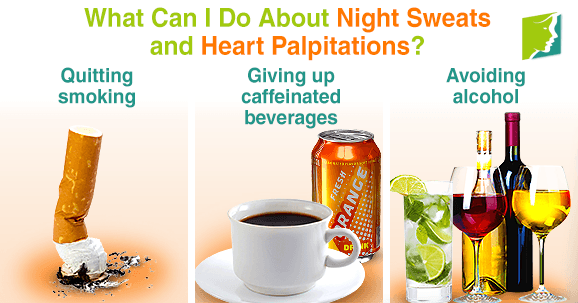Menopause has a range of symptoms from irritating episodes of night sweats to worrying heart palpitations. Although they may seem very different, both are thought to be caused by hormonal changes experienced during menopause.
What Are Night Sweats?
Night sweats refer to episodes of excessive sweating during sleep. Often times, they occur right after a hot flash happens, and your body, overheating, tries to cool itself off by sweating.
Night sweats include the following symptoms:
- A sudden and intense feeling of heat across the body
- Nausea
- Chills
- Headaches
- Irregular heartbeat
What Are Heart Palpitations?
Heart palpitations are characterized by cardiac arrhythmia (an irregular heartbeat), which cause the sufferer to suddenly become aware of their heart beating.
Heart palpitations can increase your heart rate between 10 - 16 beats per minute, and in some dramatic cases, women have experienced heart rates of up to 200 beats per minute.
Are Night Sweats and Heart Palpitations Related to Menopause?
It may be disturbing to discover that, along with night sweats, one of the most common symptoms of menopause can be heart palpitations, and they often happen simultaneously. Both are thought to be caused by menopausal hormonal imbalances. Usually, these heart palpitations will stop after a few months and don't necessarily indicate a serious health problem. However, experiencing heart palpitations for the first time can be worrying. In some cases, heart palpitations can signify an underlying health condition, so it's vital that any form of irregular heartbeat is checked out by a doctor.
What Can I Do About Night Sweats and Heart Palpitations?
If you continue to suffer from night sweats and palpitations during menopause, there are a number of approaches you can take to restore normal sleeping patterns and heart rhythm, such as:
Engage in regular exercise. This helps keep the body balanced and healthy, reducing the effects of hormone fluctuations.
Keep a balanced diet. Eating lots of fruits, vegetables, and whole grains while cutting sugar intake will help keep your body balanced and stable.
Try relaxation techniques. Yoga, meditation, and breathing exercises may help calm your body, especially if you are experiencing heart palpitations.
Quit smoking. This can significantly affect heart rate and hormone regulation.
Stop drinking caffeinated beverages. These can cause much more frequent and severe heart palpitations.
Avoid recreational drugs. This may seem obvious, but they can wreak havoc on your body and cause serious heart issues.
Avoid alcohol. It has been shown to increase the frequency of hot flashes and night sweats.
Try alternative medicines. Herbal remedies may be of some help as well.
If you are still concerned, or are uncertain if these symptoms are the result of menopause, please consult your doctor. For more specific information about reducing night sweats and heart palpitations follow the link below.
Sources
- National Health Service UK. (2014). Heart palpitations. Retrieved August 3, 2015 from http://www.nhs.uk/conditions/Heart-palpitations/Pages/Introduction.aspx
- The National Institute of Health. "Signs of the Menopausal Transition" www.nih.gov
- Boston Women's Health Collective. "Hot Flashes, Night Sweats and Sleep Disturbances". Our Bodies, Ourselves, 2006.
- Von Muhlen, DG, et al. "A community-based study of menopause symptoms and estrogen replacement in older women". Maturitas. Sept 1995; 22(2):71-8.




